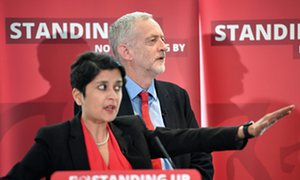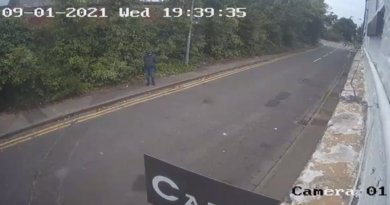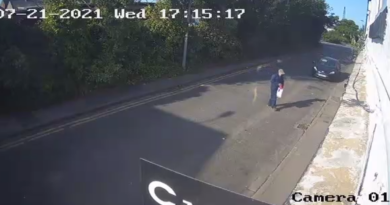Jeremy Corbyn accused of incompetence by MPs
Labour leader hits back after select committee derides Shami Chakrabarti’s ‘compromised’ inquiry into antisemitism

Jeremy Corbyn with Shami Chakrabarti at the launch of her report into antisemitism in the Labour party. Photograph: Jeff J Mitchell/Getty Images
Jeremy Corbyn has come under strong personal attack from a cross-party committee of MPs investigating the growth of antisemitism for helping to create a safe space for people with “vile attitudes towards Jewish people”.
In a damning indictment of the party and its leader, the powerful home affairs select committee claims that Corbyn’s lack of action “risks lending force to allegations that elements of the Labour movement are institutionally antisemitic”. In the report, published on Sunday , Labour is said to have been “demonstrably incompetent” in dealing with incidents of anti-Jewish abuse.
An inquiry into antisemitism in Labour carried out by Shami Chakrabarti on the orders of Corbyn earlier this year is described as “ultimately compromised”. Its independence was thrown into doubt by Chakrabarti’s acceptance of a peerage and a job in the shadow cabinet, the committee writes.
The MPs criticise Chakrabarti for describing antisemitic abuse as merely “unhappy incidents”, and note her failure to respond to requests for a timeline proving that there was no connection between her elevation to the Lords and her inquiry. They write: “Ms Chakrabarti has not been sufficiently open with the committee about when she was offered her peerage, despite several attempts to clarify this issue with her.”
The Labour leader hit back yesterday, suggesting that the committee had allowed itself to be politicised, and appearing to accuse it of sexism.
Corbyn said in a statement: “Not a single woman was called to give oral evidence in public, and the report violates natural justice by criticising individuals without giving them a right to be heard.
“The report’s political framing and disproportionate emphasis on Labour risks undermining the positive and welcome recommendations made in it.
“Although the committee heard evidence that 75% of antisemitic incidents come from far right sources, and the report states there is no reliable evidence to suggest antisemitism is greater in Labour than other parties, much of the report focuses on the Labour party.
“As the report rightly acknowledges, politicising antisemitism – or using it as a weapon in controversies between and within political parties – does the struggle against it a disservice.”
Corbyn added that he believed the committee was unfair in its criticism of Chakrabarti for being insufficiently independent. “This fails to acknowledge public statements that the offer to appoint Chakrabarti to the House of Lords came after completion of her report, and was based on her extensive legal and campaigning experience,” he said.
However, the devastating conclusions of the select committee have been seized upon by party colleagues and opponents alike who today call on the Labour leader to reform his party, and drive out those with antisemitic views.
The Labour MP Chuka Umunna, who sits on the home affairs select committee, said that the report’s conclusions were not motivated by a desire for political point-scoring but to offer justice to those affected, and it was “grossly insulting” to suggest otherwise. “From the evidence we have taken, any objective observer will conclude that the Labour party has failed to deliver on all our principles in the way that it has handled recent incidents of antisemitism – we have to be big enough and honest enough to admit this,” Umunna wrote on his Facebook page.
The Tory MP for Finchley and Golders Green, Mike Freer, said: “As leader of the Labour party, Jeremy Corbyn has a duty to face up to the problem and to take concrete action to stamp it out now – not just make mealy-mouthed condemnations.”
James Sorene, of the Israel and Middle East thinktank Bicom, said Labour should not ignore the report’s findings. “This report brings much needed clarity where previously there has been denial, obfuscation and abdication of responsibility,” he said.
The select committee inquiry was launched in April after concerns had been expressed about an increase in prejudice and violence against Jewish communities in the UK.
Its report was unanimously agreed by the all-party committee after three and a half hours of discussion. The committee was until recently chaired by the Labour MP Keith Vaz.
The committee acknowledged that there was “no reliable, empirical evidence to support the notion that there is a higher prevalence of antisemitic attitudes within the Labour party than any other political party”. Nevertheless, it is withering about the Labour leader’s response to antisemitic attacks on his own MPs, and his understanding of modern forms of racism.
The committee writes: “While the Labour leader has a proud record of campaigning against many types of racism, based on the evidence we have received, we are not persuaded that he fully appreciates the distinct nature of post-second-world-war antisemitism.”
Content retrieved from: https://www.theguardian.com/politics/2016/oct/16/jeremy-corbyn-antisemitism-chakrabarti-inquiry.



